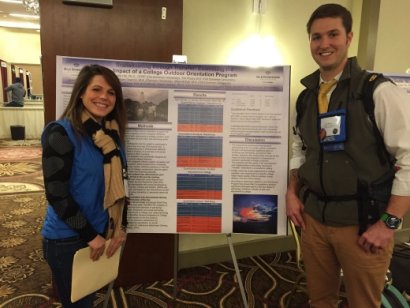ATTENTION: We are no longer accepting applications for the M.S. in Park, Recreation and Tourism Studies Program.
The Master of Science in Park, Recreation and Tourism Studies focuses on the professionalization of the park, recreation and tourism practitioner. A need exists for highly trained executives who can be a well-rounded, competent executives to tackle the ever-widening scope of responsibility in the park, recreation and tourism field. A comprehensive, malleable graduate program can prepare them in these areas.
About the Program
This program is designed to prepare students and practitioners for advanced study in the concepts, theories, research, management, and administration of the park, recreation and tourism industry. The M.S. in PRTS seeks to give students advance administrative and empirical knowledge related to organizational decision-making and recreation/tourism agency management. Expected knowledge, skills and abilities from MS in PRTS would include proper assessment, testing and evaluation; understanding of trends and demographics, psychographics; ability to implement data collection methods, reporting, application and sharing of findings; and grant writing.
The curriculum incorporates the three areas of parks, recreation and tourism. The importance of all three is that park resources are used by both recreationists (i.e., local residents/participants who recreate in parks and open spaces) and tourists (i.e., visitors/non-local participants who recreate in parks and open spaces). In an era of doing more with less, traditional park and recreation educational programs have expanded their perspectives to include tourism aspects as they relate to the administration and provision of services at local, state and national parks. Recreation and tourism are related because recreation revolves around local participants, whereas tourism is recreation outside of one's local area.
Students must choose from one of two capstone options: a 6-credit thesis or a 3-credit non-thesis/research project and an additional elective course. The thesis option requires a successful defense of the thesis prospectus. The non-thesis (research project) option requires successful completion of a comprehensive examination covering the four required PRTS core courses.
Graduates of the MS in Park, Recreation and Tourism Studies (PRTS) will have the ability to:
- Provide oversight of operations in PRT (e.g., writing/implementation of policies and procedures at facilities, risk management, inventory management, emergency preparedness, and conduct needs assessment).
- Prepare research reports and grant proposals.
- Prepare financial and business documents for PRT.
- Assess, evaluate and manage human resources in PRT.
- Serve as a subject matter expert in PRT.
- Lead organizations in an efficient and proficient manner.
- Plan, evaluate, and oversee PRT agency (e.g., local, state, national) programs (the ability to set goals and objectives, operate according to agency mission, establish priorities, plan/evaluate recreation programs and park/event services, create vision and be current with professional trends).
- Value professionalism (developing greater skills in ethical decision-making, being involved in professional organizations, being committed to the profession; networking within and outside of the profession, valuing certifications).
- Conduct research for PRT organizations by gathering and analyzing routine and complex data and communicate key information for decision-making.
- Construct well-developed and informative presentations for different constituents (e.g., community, visitors, board of directors, and other professionals).
The curriculum incorporates the three areas of parks, recreation and tourism. The importance of all three is that park resources are used by both recreationists (i.e., local residents/participants who recreate in parks and open spaces) and tourists (i.e., visitors/non-local participants who recreate in parks and open spaces). In an era of doing more with less, traditional park and recreation educational programs have expanded their perspectives to include tourism aspects as they relate to the administration and provision of services at local, state and national parks. Recreation and tourism are related because recreation revolves around local participants, whereas tourism is recreation outside of one's local area.
Students must choose from one of two capstone options: a 6-credit thesis or a 3-credit non-thesis/research project and an additional elective course. The thesis option requires a successful defense of the thesis prospectus. The non-thesis (research project) option requires successful completion of a comprehensive examination covering the four required PRTS core courses.
Graduates of the MS in Park, Recreation and Tourism Studies (PRTS) will have the ability to:
- Provide oversight of operations in PRT (e.g., writing/implementation of policies and procedures at facilities, risk management, inventory management, emergency preparedness, and conduct needs assessment).
- Prepare research reports and grant proposals.
- Prepare financial and business documents for PRT.
- Assess, evaluate and manage human resources in PRT.
- Serve as a subject matter expert in PRT.
- Lead organizations in an efficient and proficient manner.
- Plan, evaluate, and oversee PRT agency (e.g., local, state, national) programs (the ability to set goals and objectives, operate according to agency mission, establish priorities, plan/evaluate recreation programs and park/event services, create vision and be current with professional trends).
- Value professionalism (developing greater skills in ethical decision-making, being involved in professional organizations, being committed to the profession; networking within and outside of the profession, valuing certifications).
- Conduct research for PRT organizations by gathering and analyzing routine and complex data and communicate key information for decision-making.
- Construct well-developed and informative presentations for different constituents (e.g., community, visitors, board of directors, and other professionals).
Faculty & Advisors
Upon admission to the graduate program, students are assigned one of the following faculty advisors based on their area of research interest. The faculty member will work with the student to schedule classes, assist them in choosing a research track (project or thesis), and guide them throughout the research process.




